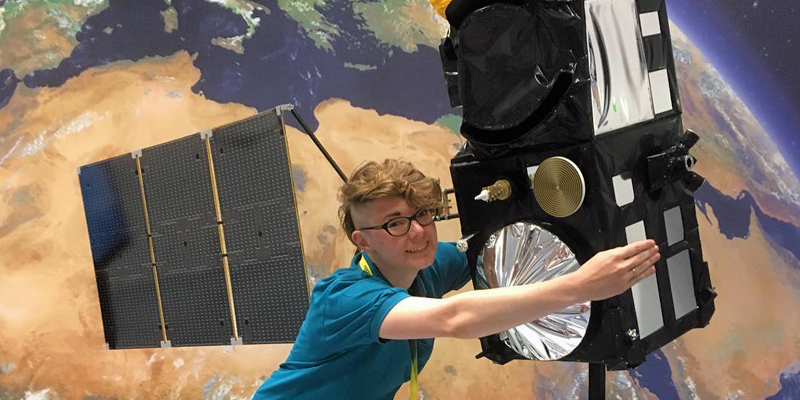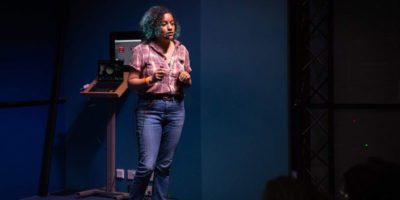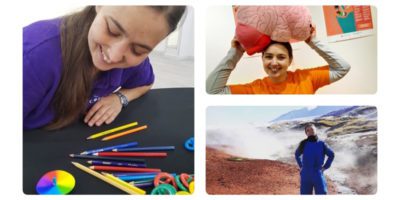Dr Hayley Evers-King is a German-based interdisciplinary scientist working at the interfaces between operational satellite data provision and marine applications. She is passionate about extending the use of Earth observation data from satellites for the widest benefit of society and she currently works in this capacity at EUMETSAT, supporting marine user engagement and training, with a particular focus on Copernicus and the Sentinel-3 and 6 missions. Hayley studied environmental science at the University of Plymouth before pursuing a master’s degree in oceanography at the University of Southampton and then a PhD in oceanography at the University of Cape Town.
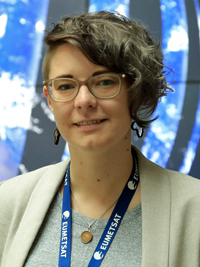
“There are so many ways to build a career in the space sector because it needs so many different skills. Whether you are passionate about engineering, environmental science, software development, communications, international policy, or working with people in project management etc. There is a place for you in this sector.”
Studying our oceans, the biggest piece of the Earth system puzzle
Motivated by my interests in the natural world and our impact on it, I started my career with a degree in environmental science at the University of Plymouth. Whilst completing my degree I decided to focus on what I consider the biggest piece of the Earth system puzzle – our oceans, and was encouraged by my dissertation supervisor to apply for a masters in oceanography at the University of Southampton.
During my masters, I began working with satellite data and I wanted to get a job where I could use this data and my analytical skills, but with only a little experience and post the 2008 recession, it was hard to find graduate jobs. At that point, I decided to pursue a PhD as a way of broadening my skills and experience. I moved to Cape Town, South Africa where I undertook my PhD, focussing on the use of remote sensing for detecting algal blooms.
This really was the most incredible experience where I was able to learn about in situ data collection, satellite data validation and algorithm development, batch processing and converting science outcomes into useful information for stakeholders. I was very lucky to work in a great research group that supported and encouraged my involvement in lots of international projects, such as with NASA and the European Space Agency.
After my PhD I got a job as a research scientist back in Plymouth, at Plymouth Marine Laboratory (PML). At PML I spent about half of my time working on applications of satellite data including water quality, ocean carbon, and climate modelling; and the other half I spent providing support services to satellite operations as part of the European Union’s Copernicus programme.
It was this work that really captured my interest for the next move of my career – working as a marine applications expert at EUMETSAT in Darmstadt, Germany, where I have been since 2019.
Working collaboratively to drive forward humanity’s quest for knowledge
The European Organisation for the Exploitation of Meteorological Satellites (EUMETSAT) is an international organisation that operates satellites on behalf of its member states and the European Commission. As part of this, EUMETSAT delivers weather, ocean, atmosphere, and climate data to a wide range of users in meteorological and other operational agencies, scientific research, and businesses.
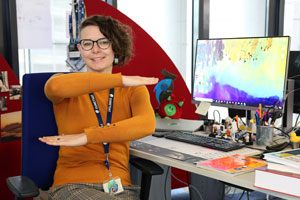
The work that I do changes day-to-day. Routine activities involve communicating technical information to our users about the status of our satellites and data delivery services, including any operational issues, new products etc. I’m also involved in regular coordination meetings with our partners such as the Copernicus Marine Service, where we will evaluate how the satellite data products are working for users, and discuss new evolutions of projects and services.
Information and inspiration
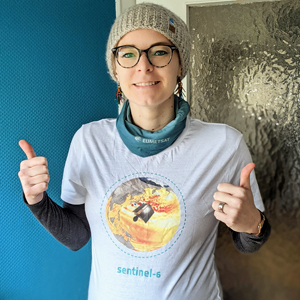
This has involved everything from writing case studies for our web page, writing and sharing open-source code, presenting on massive open online courses, contributing to scientific conferences, to hosting hackathons, podcasts, and social media ask-me-anything events.
The growing importance of satellite data
With COVID-19 we had to move to full offsite working very rapidly. For most of our day-to-day meetings we were able to adapt quite fast, but it has been a challenge for our training events and for the planning for our new mission (Sentinel-6) which always requires people to work in our operations facilities to set up the systems needed.
It’s brought a lot of positives – we’ve learned how to host better events online, which helps with our long term aims to reach more people and reduce our environmental impacts from travel.
In general, EUMETSAT’s work has become even more important in these times as fewer people have been able to get out and make in situ measurements – making satellite data even more valuable. The ocean is vast, and often inaccessible so it is impossible to monitor our marine environment using just measurements collected by people.
Satellite data can measure ocean properties at unprecedented temporal and spatial scales, and new instruments and analysis methods are always being developed to measure more properties. Just as understanding the ocean is absolutely key to understanding our planet and how it functions now and in future, so using satellites is absolutely key to gaining this understanding.
Problem-solving needs as many perspectives as possible
Diversity is important everywhere but particularly so in fields that require problem-solving. We need as many people with as many perspectives as possible to innovate in the space sector, and also to make sure that what we do is fit-for-purpose in terms of helping society.
There are so many ways to build a career in the space sector because it needs so many different skills. Whether you are passionate about engineering, environmental science, software development, communications, international policy, or working with people in project management etc. There is a place for you in this sector.
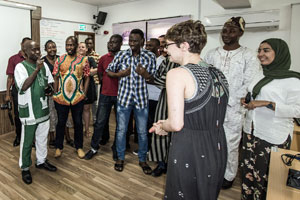
So, my recommendation to anyone looking to enter this sector is to gather some skills that suit you and then see where they can be applied – it’s a really great time for the sector with new programmes and lots of support and need for developing applications of space technology. There are many freely available training opportunities now, and social media offers lots of ways to get involved and known to the community.
Coming up next
We are moving into the next phase of the European Commission’s Copernicus programme, so I’m very excited about all that will bring. I’m looking forward to expanding what we can do with marine satellite data by working with more organisations to apply it to the challenges they face. Soon we will be releasing Sentinel-6 data to the public, and I think that will open up new ways of using information about sea level, as well as strengthening our long term climate records.
We will also start to prepare soon for further missions – particularly the Sentinel-3 C and D satellites which EUMETSAT will also be operating, and for which I will be providing expert support. We are gathering more and more data, so I’m also excited about all the cloud computing, big data, and artificial intelligence initiatives that are developing. I’m a keen programmer and like to be hands-on with the data, so I’m hoping to do even more to support users by sharing open-source code and tools.
https://www.linkedin.com/in/hayleyeversking

